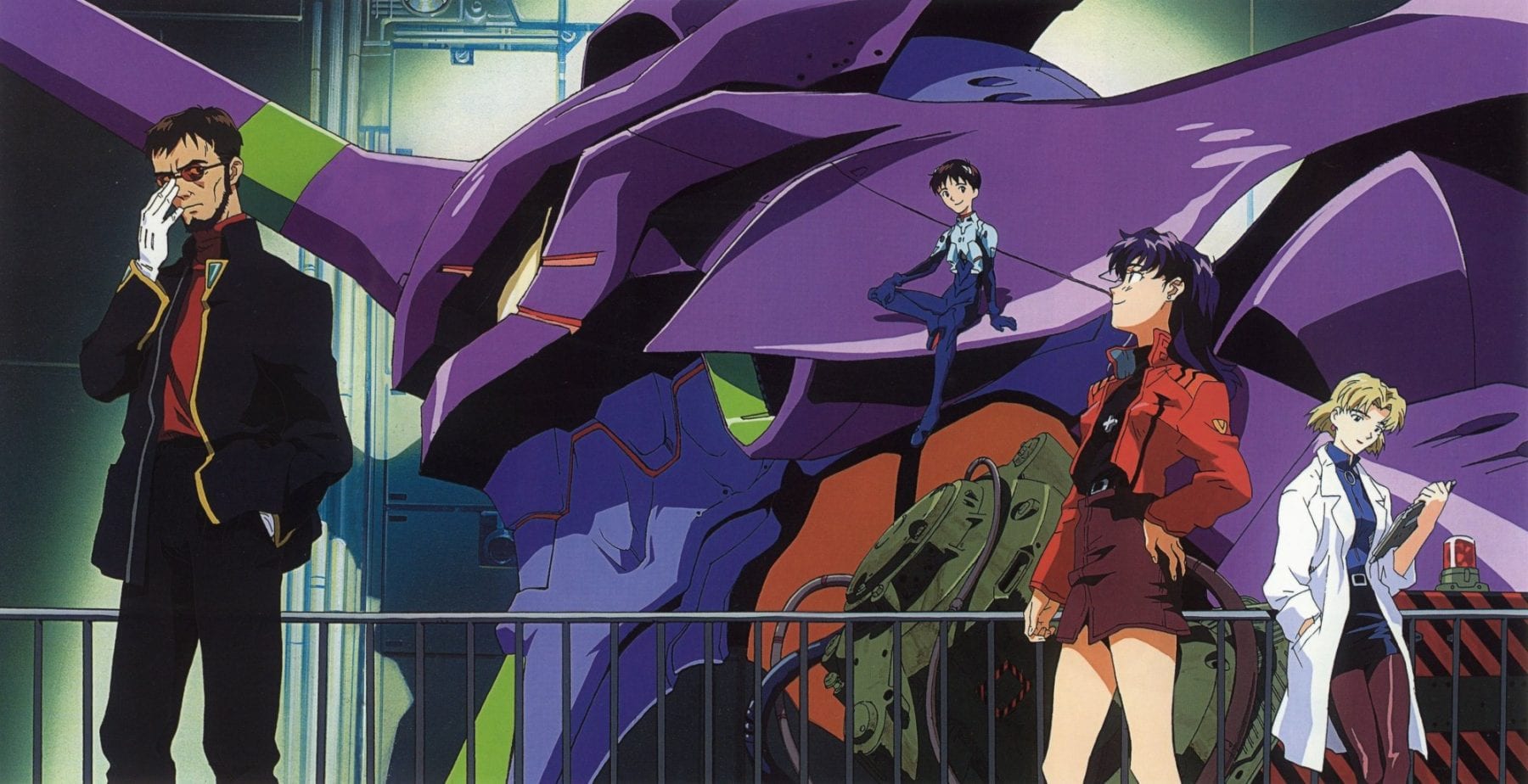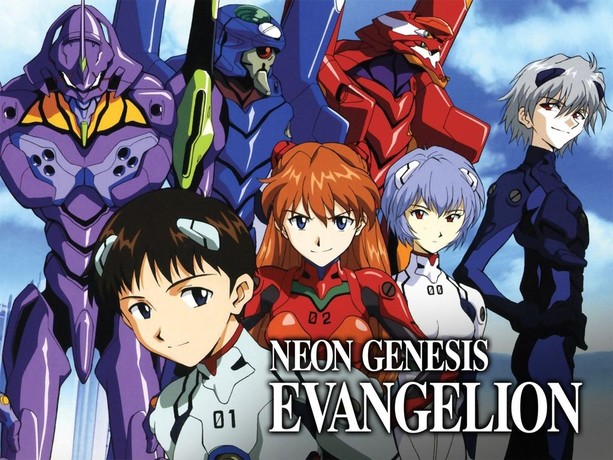


Adult Swim Action was known for showing American fans the artistic achievements of anime as a medium and aired edgy, mature action cartoons unlike anything made in the West in that time period. The block’s offerings are often considered candidates for Greatest Anime of All Time, including Cowboy Bebop, FLCL, Trigun, and Fullmetal Alchemist. The subject of this retrospective is also a frequent candidate in the Greatest Anime of All Time debate, Neon Genesis Evangelion, which debuted on the block October 20, 2005. This title was previously released in the US on VHS way back in 1997 and a few episodes aired heavily censored during Giant Robot Week on Cartoon Network’s Toonami block back in 2003 (a debacle that is best left forgotten), but the 2005 Adult Swim airing is probably gave the series its biggest exposure to a widespread audience.
One thing that Adult Swim Action was known for was its tendency to obtain artsy and weird titles, and Neon Genesis Evangelion was very much artsy and weird. On paper, it has a premise that similar to a lowbrow blow ’em up action cartoon. A boy pilots a giant robot and fights giant monsters called Angels in a post apocalyptic earth devastated by an event known as the “third impact.” He hangs out with two cute and highly merchandised pilot girls and action happens. The thing is that this series is actually less about the teens blowing stuff up in giant robots and more about the characters’ mental health struggles as the entire cast has to deal with a great deal of personal trauma.

The protagonist Shinji Ikari, is the “Third Child,” who is conscripted to pilot the Eva Unit 01. He is not happy with having to risk his life and limb in order to save humanity from imminent destruction. His father, the cold and calculating Gendo Ikari, is very unempathetic to Shinji’s plight. Due to the psychological phenomenon of “the hedgehog’s dilemma,” Shinji is hesitant to make friends in fear of hurting them and he is a very shy and introverted kid. The first of Shinji’s partners, Rei Ayanami is a seemingly emotionless girl with a mysterious background. His other partner is Asuka Langley Soryu, a German-Japanese girl with immense anger issues who constantly berates Shinji and treats him terribly. Because Gendo is so busy doing stuff with shady secret organization SEELE, Misato Katsuragi is the main person who allegedly takes care of Shinji. Instead, she is a wild alcoholic party animal with her own set of psychological issues. Probably the happiest member of the cast is Pen Pen the Penguin, who lives in Misato’s beer fridge. Aside from having a cute penguin mascot, this show is mostly about miserable characters being miserable.
 In addition to the angst, the weirdness and avant-garde nature of this show is also famous. There is lots of Christian symbolism in the show that the writers insist has no actual meaning and is just there for “flavor,” but fans still insist on figuring out the meaning of said symbolism. This retrospective won’t spoil the big major twists for new fans, as the shocking and weird things that happen in this show are what its most famous for. The use of classical music in the soundtrack accompanied some of the most shocking and disturbing things that happen in the show and the show used long still shots for some very unorthodox but unforgettable cinematography. As the show goes on, the storytelling becomes more and more obtuse and abstract, meaning that fans have been arguing about the interpretation of the show for decades. The series is incredibly violent, gory, depressing, and open to interpretation.
In addition to the angst, the weirdness and avant-garde nature of this show is also famous. There is lots of Christian symbolism in the show that the writers insist has no actual meaning and is just there for “flavor,” but fans still insist on figuring out the meaning of said symbolism. This retrospective won’t spoil the big major twists for new fans, as the shocking and weird things that happen in this show are what its most famous for. The use of classical music in the soundtrack accompanied some of the most shocking and disturbing things that happen in the show and the show used long still shots for some very unorthodox but unforgettable cinematography. As the show goes on, the storytelling becomes more and more obtuse and abstract, meaning that fans have been arguing about the interpretation of the show for decades. The series is incredibly violent, gory, depressing, and open to interpretation.
To some anime fans, the show is too much. Some fans believe Shinji to be “a wimp,” while others feel very bad for the poor kid and all the trauma he goes through. Some find Asuka to be too much of a jerk, but her backstory has given her defenders as what she experienced was absolutely horrific. Fans argue if the show is profound or pretentious, but those who love the show really love it. What fans can agree on is that the opening song, “A Cruel Angel’s Thesis” is a banger and the closing theme, a cover of iconic song “Fly Me to the Moon,” is also awesome. Neon Genesis Evangelion has had enduring popularity through the decades and is still often argued as the potential greatest anime of all time. There are still lots of cosplayers of the main cast, Rei and Asuka are still cute enough to get loads of merchandise based on them to this very day.
Unfortunately for Adult Swim, the block attempted to follow up Neon Genesis Evangelion with more artsy anime titles, but hardly any title could meet its acclaim. When 2006 rolled around, the crowd-pleasing wide appeal action anime Bleach came and kept the anime block alive while the “artsy” anime on the block continued to flop. This culminated in Adult Swim Action rebranding to Toonami in 2012, a brand known for mainstream action anime like Dragonball Z and Naruto. When the baton for Adult Swim anime programming director passed from Kim Manning to Jason Demarco, the “artsy” shows started to be phased out, a decision that has split fans forever into team ASA/Kim Manning and team Nu-Toonami/Jason Demarco.
 Still, the franchise was such a big part of Adult Swim’s history that Nu-Toonami aired two movies from the franchise. The Rebuild of Evangelion franchise was a twenty-first century reboot of the series that seemed to tone down the avant-garde weirdness and upped the action. It still had angst, but had an ending that felt far less bleak than the television show. The movie added another pilot girl to mingle with Shinji, Mari Makinami, who doesn’t seem to have much baggage and angst and provides a great deal of fanservice. Some fans believe that the new movies were vastly inferior and dumbed down from the television series, but others believed the movies were a refinement of the admittedly low budget television anime. There were four movies in the reboot franchise, but only the first two aired on Nu-Toonami in 2013. When the movies reran again in 2014, Neilson ratings were low enough that Nu-Toonami began to almost entirely stop airing movies and began to stick exclusively with television shows, so the third and fourth movie never aired, which is a shame.
Still, the franchise was such a big part of Adult Swim’s history that Nu-Toonami aired two movies from the franchise. The Rebuild of Evangelion franchise was a twenty-first century reboot of the series that seemed to tone down the avant-garde weirdness and upped the action. It still had angst, but had an ending that felt far less bleak than the television show. The movie added another pilot girl to mingle with Shinji, Mari Makinami, who doesn’t seem to have much baggage and angst and provides a great deal of fanservice. Some fans believe that the new movies were vastly inferior and dumbed down from the television series, but others believed the movies were a refinement of the admittedly low budget television anime. There were four movies in the reboot franchise, but only the first two aired on Nu-Toonami in 2013. When the movies reran again in 2014, Neilson ratings were low enough that Nu-Toonami began to almost entirely stop airing movies and began to stick exclusively with television shows, so the third and fourth movie never aired, which is a shame.
Right now, you can find Neon Genesis Evangelion on Netflix, but not with the dub fans who watched the show on VHS or Adult Swim are familiar with. The series had a very divisive new dub with a different cast and different script. Some newer fans have been introduced by the Netflix version, but fans of the 1997 dub tend to not be happy. The Rebuild of Evangelion films can be found on Amazon Prime.
Although not without its detractors, Neon Genesis Evangelion is a very important piece of Adult Swim history and some consider it the greatest title they ever aired. While many Adult Swim anime have been forgotten, this series is still a heavy topic of discussion to this very day.
Discuss this article on the Toonzone Forums!
The post “Neon Genesis Evangelion”: A 20th Anniversary Adult Swim Retrospective appeared first on Anime Superhero News.